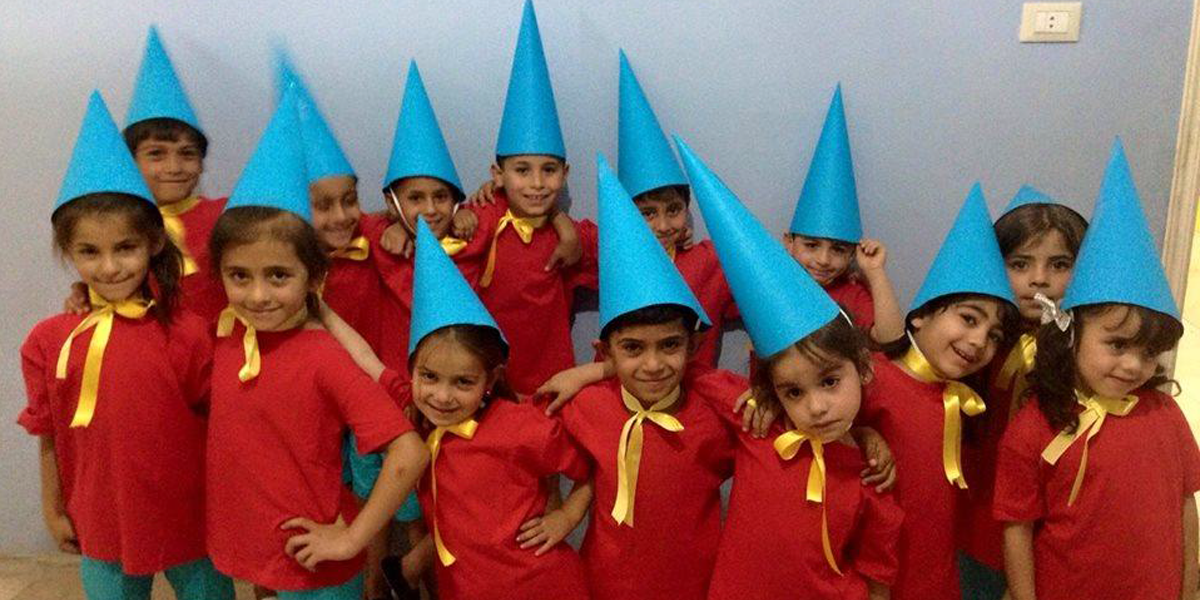Lebanon: JRS offers hope through education
22 January 2016

(Beirut) 22 January 2016 – Gharam, a 14-year-old girl who fled to Lebanon from Syria with her family to escape her country’s longstanding civil war, longs to return home. But in the meantime, a Jesuit Refugee Service school she attends in her host country has been a welcome oasis in an otherwise turbulent world.
“When I miss a day of school, I feel like life has returned and closed the doors,” said Gharam, who lives in Jbeil, a district in northeast Lebanon where tens of thousands of Syrian refugees live. “When I return to school I feel like I have returned to life because that’s where the teachers and friends are who helped me forget my sadness and anger from the war, as if I’m in another world that is beautiful and wonderful.”
Lebanon has welcomed about 1.5 million Syrian refugees since civil war erupted in neighboring Syria in 2011, accounting for about a quarter Lebanon’s current population. But the influx of an estimated 502,000 school-aged Syrian refugee children has stretched the host country’s public schools to the limits.
Even when Syrian refugee children are accepted into Syrian schools they often find it difficult to assimilate, as they face challenges such as foreign languages barriers, discrimination, bullying, social and economic issues, and unpredictable enrolment regulations.
So in response, Jesuit Refugee Service offers extensive education and language training programs in Jbeil and in Kafr Zabad – two areas in Lebanon with high concentrations of Syrian refugees – to help refugee children prepare for Lebanese public schools.
While final figures for 2015 aren’t yet available, more than 800 children were enrolled in JRS- classes in Jbeil and in Kafr Zabad during the first half of the year – about double compared with the same time period in 2014. And despite the program’s progress, increasingly high demand for classes mean there is a waiting list of potential students eager to enroll.
“I was expecting (the JRS program) would be like other schools where they treat students aggressively and hit and abuse them,” Gharam said. “But I felt comfortable and adapted quickly, and I started to feel a change in my life in the way I treated other people with respect and tolerance and love, and a change in the level of my education.”
All of the more than 170 JRS students in Jbeil and in Kafr Zabad who took placement tests for the Lebanese school system during the first half of 2015 earned passing grades. But with classroom space tight, it’s uncertain how many children will have the opportunity to attend regular public schools.
Increasingly desperate living conditions of refugee families have created stressful home environments that threaten to undermine their children’s education, with some children dropping out of school so they can work to support their family. So JRS added social workers to its educational programs in 2015. Absentee and dropout rates since have dropped significantly.
In addition to education needs, JRS also routinely provides refugee families with food baskets, hygiene products and items to help them cope with winter, such as blankets, heaters, drapes and carpet.
JRS students in Lebanon say they’re grateful for the opportunity to continue their studies but can’t wait to one day return to their home country.
“JRS changed my whole life,” wrote Nour Sawan, 14, a JRS student in Kafr Zabad. “The most beautiful thing in my school is my special teachers. They illuminate my future and guide me and encourage me to continue my studies and to be a special person in the community. (But) I miss my home in Syria and my relatives and my friends. I wish to go back to Syria and realize my dream, which is to become a famous fashion designer.”
Mahdi Al Hussein, 15-year-old JRS student in Kafr Zabad, wanted to be a doctor as a young child in Syria. Now, another profession has caught his interest.
“I hope to become a pilot in the future to go away from the discrimination and bigotry in this world,” he wrote. “I hope that peace return(s) to Syria, my lovely country.”
“When I return to school I feel like I have returned to life because that’s where the teachers and friends are who helped me forget my sadness and anger from the war, as if I’m in another world that is beautiful and wonderful.”
